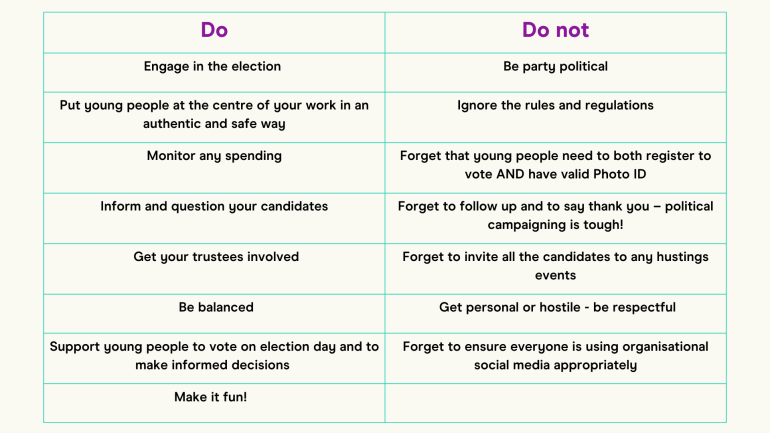A General Election has been called for Thursday 4th July. It provides Youth Access Members with an important opportunity to:
- engage young people in democracy
- campaign for national change
- establish strong relationships with local politicians and your future MP
This quick guide pulls together a range of resources and some top tips to support you during the General Election campaign. You can find more resources on our Election hub and Influencing library. We also encourage you to use the Forum to ask questions, and support other members by sharing your experiences.
We hope you find this guide useful. We would love to hear about your plans as they develop so we can showcase them to the rest of the membership. If you feel like specific resources in areas we have not covered would be useful or have further questions please get in touch with Policy and Campaigns Manager, Sarah at [email protected]
Youth Access disclaimer for members using this pack:
In the run up, we also wanted to remind you that any activity done as part of the Youth Access is subject to charity law and the Transparency of Lobbying, Non-Party Campaigning and Trade Union Administration Act 2014 "The Lobbying Act". Not all members of the Youth Access are charities, but when doing anything under the Youth Access umbrella, or using the logo, members must follow charity law and the Lobbying Act. As Youth Access, and when acting as a Youth Access member, we do not endorse or support any political party, politician, or candidate. We act in a cross-party way. Youth Access does not, in its communications or activities, seek to influence how people vote. By continuing to campaign with us, and take part in Youth Access activities, members agree that they will not carry out any regulated activity under the auspices of or using the brand and identity of Youth Access.

Rules and regulations during elections
As charities, Youth Access members must be mindful of both Charity Commission and Electoral Commission regulations and guidelines during the General Election campaign. Whilst Electoral Commission rules apply UK-wide, each of the three Charity regulators have their own (albeit very similar) guidelines:
- Charity Commission for England and Wales
- Scottish Charity Regulator
- Charity Commission for Northern Ireland
In this guide we rely on the guidance of the Charity Commission for England and Wales.
Charity Commission for England and Wales
Charities should not be afraid of engaging in politics and the Commission is clear that advocacy and campaigning is entirely legitimate activity that is in the public interest. The Charity Commission sets out some clear guidance about the way that charities should engage in politics to help maintain trust in the sector:
The key points are:
- Political activity must align with the organisation’s charitable objects
- Charities cannot exist exclusively for political purposes and should not be party political
- Campaigning materials can be emotive but they must be factually accurate
- Charity resources should not be used for political activity for free or at a discounted rate
Electoral Commission
The Electoral Commission has specific rules for organisations that are not political parties but are engaging in political campaigning during election campaigns. These are called the Non-Party Campaigners rules and regulations. You can find the guidance on these rules here:
Electoral Commission guidance
Non-party campaigners need to register with the Electoral Commission if they meet the following requirements:
- Spend more than £10,000 on election activities
- Spend that money during the regulated period, defined as a period of one year before the day of the election (so from 6th July 2023)
- Spend that money on regulated campaign activities
Regulated campaign activities can be identified based on the ‘purpose test’. The purpose test requires the activity to be made available to the public and to be intended to influence voters. Examples might include press conferences, production of campaign materials, transport to participate in campaign activities, canvassing or market research to understand voter intentions, public rallies and events. It would not include voter registration activity.
Remember, there is nothing wrong with registering as a non-party campaigner. It does however require an additional set of reporting and monitoring requirements to the Electoral Commission.
Lots of organisations have produced brilliant guidance and resources to support charities in this area. NCVO and Lloyds Bank Foundation are particularly useful:

Democracy and young people
Many young people will never have voted before and may not be particularly interested in politics. Research suggests however that supporting a young person to vote can result in a life-long habit of voting, so it is worth the effort!
Registering to vote
Encouraging and supporting young people to vote is quick, easy and can be the first piece of activity you undertake as part of wider work in the election campaign.
If you are not a British citizen you can check if you are eligible to vote.
Check if you are eligible to vote
Remember that this is the first General Election where voters will need to be both registered to vote, but also bring valid Photo ID with them to the polling station.
Give an X is a youth-led, non-partisan youth voter registration campaign for the UK. Their social media contains lots of information for young people to help them register to vote.
Deadlines:
- Register to Vote 23:59 Tuesday 18th June
- Apply for a postal vote 17:00 Wednesday 19th June
- Apply for a proxy vote 17:00 Wednesday 26th June
- Apply for a Voter Authority Certificate 17:00 Wednesday 26th June
- Polling Day 07:00 – 22:00 Thursday 4th July
Under 18s
Whilst those under 18 cannot vote, they can still get involved in lots of different ways. They could register for a vote with the Our Generation, Our Vote Campaign which is holding an election for under 18s alongside the General Election: https://www.democracyclassroom.com/resource-categories/our-generation-our-vote
Engaging with the candidates, their parties and their platforms
Democracy Classroom has a brilliant website with resources to help engage young people with the election.
Engaging with your local candidates directly is one of the best ways to get young people involved in the political process.
Find out who your candidates are here
Organising a hustings event can be a great way to get candidates in front of young people and provide young people an opportunity to have their questions answered and their voices heard. ‘Non-selective’ hustings (where every candidate is invited) are not generally classed as campaigning activity. The Electoral Commission has specific guidance for running a hustings.
Electoral Commission Guidance on Hustings
If you are holding a youth hustings, you can find a map of youth hustings across the country and add your own.
Husting map Add your hustings to the map
Remember that a hustings is only one way to hear from candidates. You could also send candidates a list of questions from young people to answer for example, invite candidates to visit your organisation, or you could provide young people with an opportunity to look at the manifestos and campaign literature from each local candidate and discuss them.
Polling day
On polling day you might want to send texts to young people you support reminding them to vote and you may also consider providing support to get them to and from the polling station to vote – especially if they have additional needs.
Be especially mindful on polling day that their vote is their choice and you are just there to provide them the help they need to cast it. At the polling station, the officers and staff on hand will be very happy to support you in this.
Young people can find their polling station here: https://wheredoivote.co.uk/ or on their local council website.
Electoral Commission has advice for voting in person

Campaigning for change and building relationships
Youth Access Key Policy Asks
Together with our member services and the young people they work with, we call on political parties to commit to changes that see:
- Young people in all local communities able to access advice and counselling services
- Mental health support that meets young people's needs and rights
- A fair plan for young people in social welfare policy and decision making
Find information about the key asks
We encourage members to use the key policy asks to engage their local candidates and to ask them to pledge their support for them.
We recommend tailoring any communication about the three asks to reflect the local context. For example, you could use your own data, experiences, or feedback from young people to help candidates understand the local challenges and why these national asks are important.
Engaging with candidates
Here are our top tips:
- Authentically put young people at the centre. Candidates are often keen to engage young people.
- Be clear – do you want them to visit? attend a hustings? answer a set of questions? Make communication as simple and quick as possible. Candidates are incredibly busy and keeping things simple will increase your chances of success!
- Make sure all engagement is polite and friendly. We can all do our bit to improve the quality and tone of political debate in the UK.
- Say thank you. Politics is often a thankless task!
- Follow-up afterwards any engagement to set out the next steps and continue building the relationships.
- Try to stand out and make a big impression. Candidates’ will have lots of people vying for their attention.
- Provide information . Candidates will find local facts and figures useful in their campaigning work and in their advocacy work if they win the election.
- Be fair, balanced and factually accurate. Its important to be professional and establish your position as a trusted partner.
- Use emotive language judiciously. The work we do is emotive and we should not be apathetic. Conversely, if everything we say is highly emotive it can actually undermine our message.
Managing risk for your organisation
Given the role of the Charity and Electoral Commission during General Elections, work to engage local politicians should have good oversight from your board of Trustees. Youth Access recommends having a trustee who takes a particular responsibility and interest in overseeing and understanding this work.
Good practice in managing risk during elections should include:
- Having an organisational risk assessment for all planned activity
- Recording all spending and documenting a ‘purpose test’ for any activity
- Ensure social media accounts follow the rules closely
- Remind staff about organisational social media policy for their personal/professional accounts
- Remind all staff about their role in supporting young people to make informed decisions as voters
- Correct any mistakes quickly and transparently
- Do a wash-up exercise after July 4th to capture what went well and what you could do better next time
In summary
